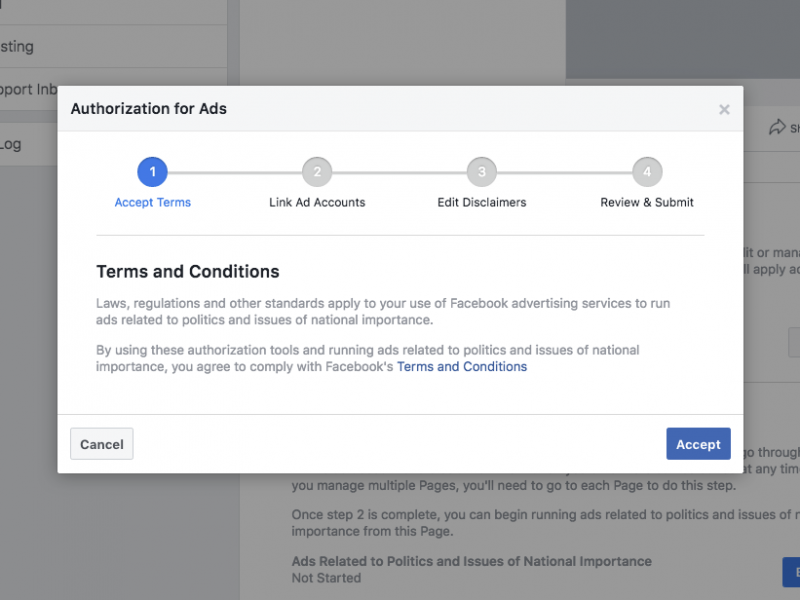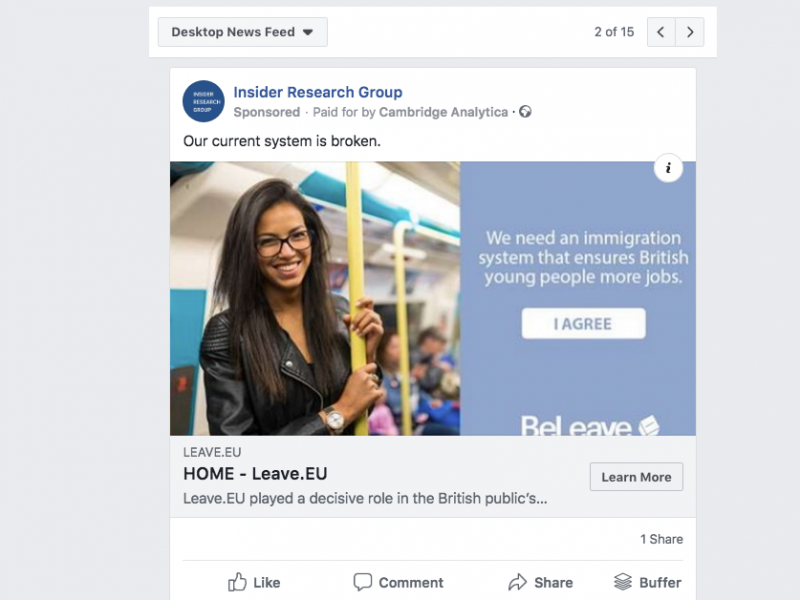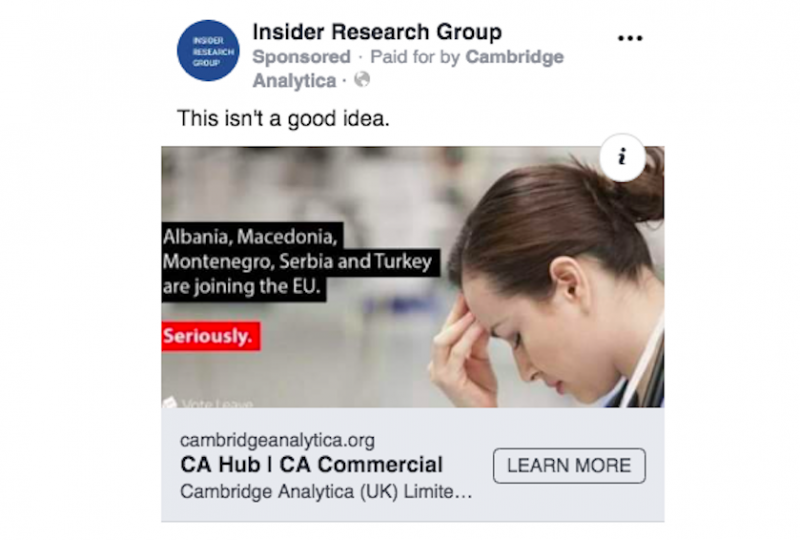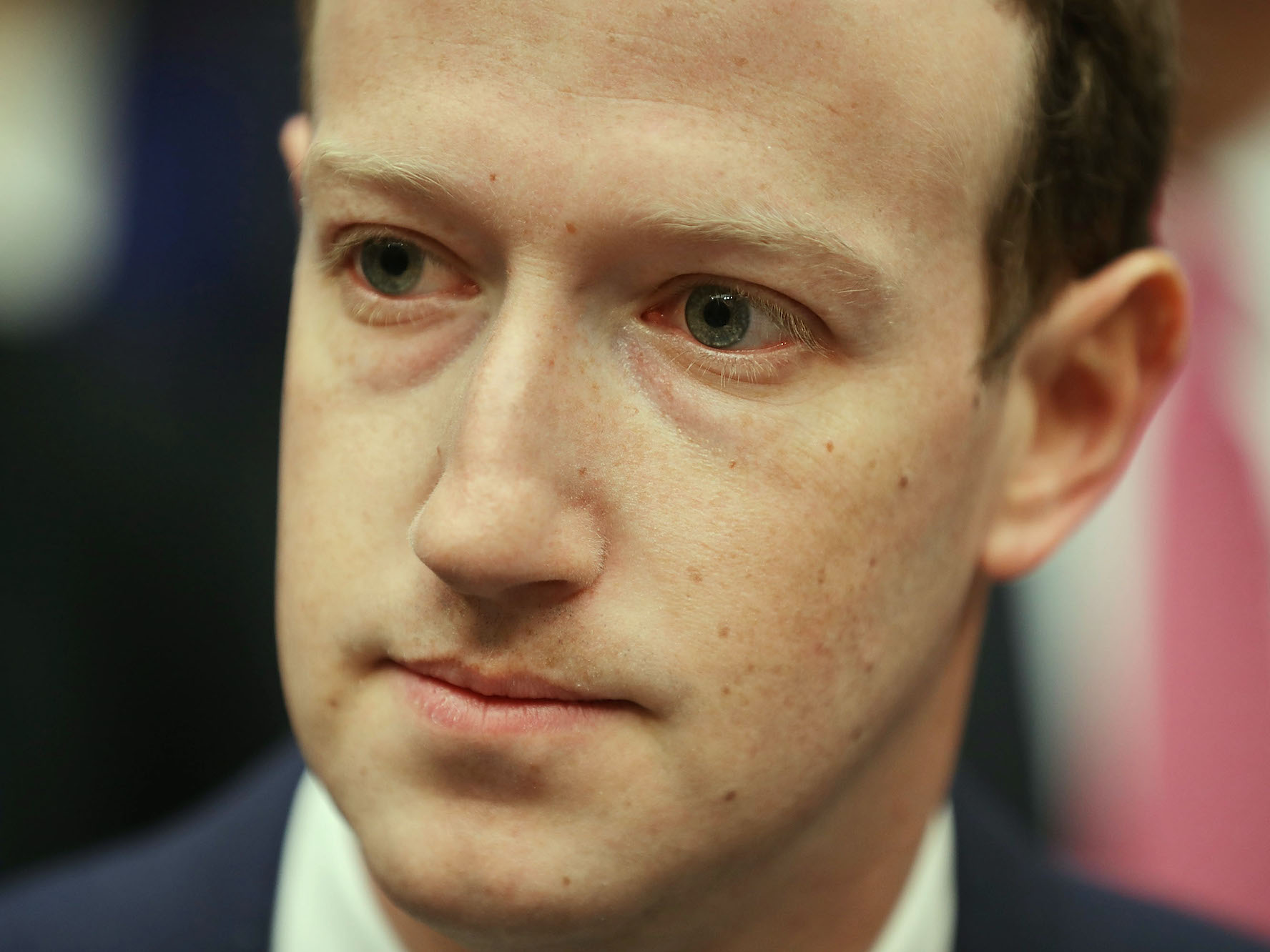- A new Facebook tool that shows users who is paying for political ads can be easily manipulated.
- Business Insider ran two fake ads listed as “paid for by” the defunct political consultancy Cambridge Analytica, despite the fact Cambridge Analytica is banned from Facebook.
- Facebook’s verification and ad approval processes did not catch the two fake ads, which ran for two days to a limited audience.
- Facebook pulled down the ads after they violated its policies. It said the ads transparency tool will be important to show users who is “accountable for any political ad.”
Facebook’s new political ad transparency tools allowed Business Insider to run adverts as being “paid for” by Cambridge Analytica, the political consultancy that dragged Facebook into a major data scandal this year.
The investigation demonstrates that political advertising on Facebook is still open to manipulation by bad actors, even with greater efforts at transparency. This is despite commitments from chief executive Mark Zuckerberg to solve the company’s misinformation problem.
Vice first reported last week that the Facebook political ads tool could be manipulated, with the publication securing approval to buy fake Facebook ads on behalf of US Vice President Mike Pence, terrorist group ISIS, and 100 US senators.
Business Insider carried out a similar test, setting up false political ads that were captioned as being “paid for by Cambridge Analytica,” the defunct political advertising firm that harvested Facebook data and weaponized it during the 2016 US election. Cambridge Analytica is banned from Facebook and has gone into administration.
Earlier this month, Facebook introduced a compulsory "paid for" disclosure for any advert relating to political issues in the UK. The feature has been live in the US since May and is also available in Brazil. The goal is to show users who is paying for ads that are attempting to sway their votes or opinions on significant political issues. Additionally, anyone who wants to post political adverts now has to clear several verification hurdles.
How we got fake ads on Facebook
The test involved Facebook approving Business Insider to place political ads on its services. That required verifying our driver's licence and a UK address.

Once these were verified, we were temporarily approved to post political ads via a Facebook page.
Business Insider set up a page posing as a non-governmental organization, called "Insider Research Group," and ran two ads with the disclosure "paid for by Cambridge Analytica."
We used existing ads that had been run by the Vote Leave and BeLeave campaigns during the UK's Brexit referendum in 2016. We accompanied them with inflammatory captions and links to Leave.EU and Cambridge Analytica's website.
Here's a screenshot of one ad we ran:

And the second ad:

We chose to run the ads over two days to a limited local audience in east London to test whether Facebook's moderators or automated filters would pick up on the fake "paid for" disclosure or the Cambridge Analytica name.
Running a campaign and setting it live on Facebook requires further approvals from the company, separate from its requirements for running political ads. But at no point during the verification or approvals process did Facebook flag the ads for not meeting its standards.
The adverts were seen by Facebook users and brought to the attention of Observer journalist Carole Cadwalladr, who blew open the Cambridge Analytica scandal in an interview with whistleblower Christopher Wylie in March.
Facebook pulls the fake ads down
Facebook confirmed that the adverts violated its policies, even though they were not caught during the approval process. The company did not explain how the adverts slipped the net.
A spokesman said: "This ad was not created by Cambridge Analytica. It is fake, violates our policies and has been taken down. We believe people on Facebook should know who is behind the political ads they're seeing which is why we are creating the Ads Library so that you can see who is accountable for any political ad. We have tools for anyone to report suspicious activity such as this."
Facebook said it takes both a proactive and reactive approach to approving the "paid for" disclosures. The two ads originally appeared in Facebook's archive of all UK political ads on its site, but have now been labelled as "disapproved." The company emphasised that it needs the help of users, journalists, and researchers to report suspicious activity.
Facebook's transparency tools are intended to help people become better informed about potential misinformation and inflammatory political advertising on its platform. The social network has come under close political scrutiny for its role in enabling misinformation during the 2016 US presidential election and, to a lesser degree, the UK's Brexit vote.
Business Insider's investigation follows UK politicians uncovering evidence of a shadowy ad campaign encouraging British citizens to lobby against Prime Minister Theresa May and her plan for Brexit. That campaign predates Facebook's transparency tools, but conservative politician Damian Collins stated that it was worrying "we have absolutely no idea who is behind it."
Collins said in a statement to Business Insider on Wednesday: "The fact that Business Insider was able to run political adverts on Facebook posing as Cambridge Analytica, who are supposedly banned from the platform is extremely worrying. It demonstrates that Facebook does not have the right systems and processes in place to implement their own rules and standards.
"Transparency around political advertising is essential if public trust is to be restored in Facebook. The revelation of yet more gaping holes within their advertising system, does not demonstrate to me that Facebook are do all that they can to move beyond the past troubling year."
Collins called on Mark Zuckerberg to appear before UK lawmakers and answer questions about the spread of misinformation on its platform.
At the UK launch of the ad tools earlier this month, Facebook said the new service was not explicitly designed to catch malicious actors, but to provide transparency. But Business Insider's small test does raise questions about the efficacy of Facebook's verification processes.

